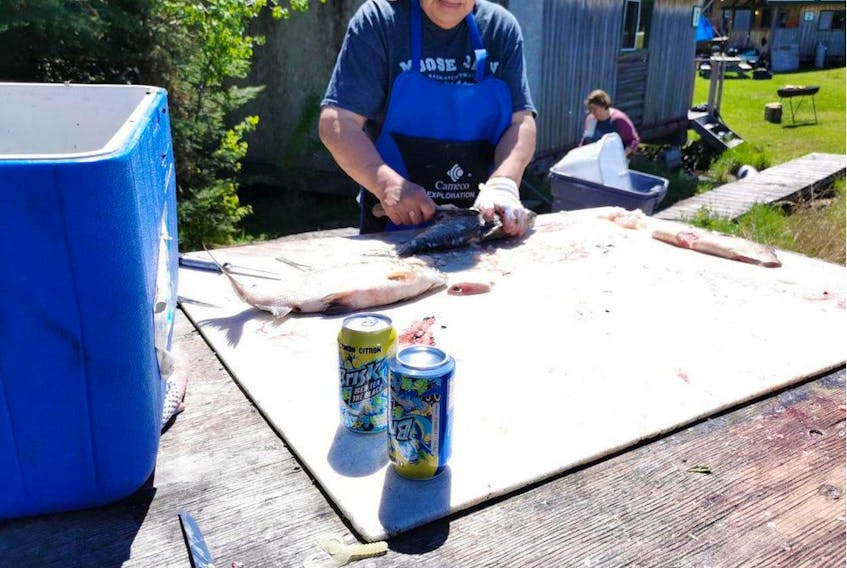Unable to accept the idea of her grandchildren being stuck inside at home, unsure how long social distancing would be in place due to the COVID-19 pandemic, Annie McKenzie has done her best to ensure they’ve created life-long memories during this unforgettable point in history.
McKenzie, an elder from Stanley Mission, decided to bring her family to her trapline so she and her grandchildren could stay busy, enjoy the outdoors and reconnect with the land.
“(I) wanted to bring my grandchildren out here to be healthy out here,” McKenzie said. “So, they could stay active and not be indoors all the time.”
Jim’s Fishing Camp, located on a beautiful piece of land in the area, is just a five-minute hike to Nistowiak Falls — one of the highest waterfalls in Saskatchewan. The nearby Stanley Mission Anglican Church is currently the oldest building in Saskatchewan. And, there are small cliffs that have thousand-year-old paintings that have withstood the elements and time.
McKenzie knows how lucky she is to live in such a location.
“(I) feel happy and blessed to be here with the waterfall and this beautiful place,” Mckenzie said.
“But it’s nothing new (to me). I grew up on the trapline way downriver, so this is my lifestyle.”
McKenzie has been on the current trapline since March 17. When the ice was breaking up, her grandsons would check in on her every couple of days, despite the danger of travelling on the ice during spring break-up.
McKenzie used to do plenty of fishing and trapping. Now, she relies more on her grandkids, although she can still fish off of the dock and deftly cleans and filets the catch of the day. Aside from a type-2 diabetes diagnosis 10 years ago, McKenzie has been healthy.
She plans on staying there until the pandemic is over “unless I get sick,” she said, “or if there are any community events.”
The daily chores for McKenzie and her family include gathering and chopping wood, and fetching water from the lake. They make time for fishing, followed by the filleting, cleaning and cooking (over a fire or an old-fashioned fish-fry are faster methods, while smoking it takes around eight hours). The store-bought food they eat was brought via three snowmobiles to the trapline in March, and lasted the family into June.
The grass needs to be cut every so often and the various cabins — which patrons use when the fishing camp is in operation — need to be maintained. The fishing camp is not in operation this year, a drastic change from most years; typically, the camp is busy during the summer months, with people beginning to call in March and booking cabins and rent boats to go fishing and sight-seeing.
These days there seem to be few families that have a trapline. That wasn’t always the case, noted Chief Tammy Cook-Searson. It was as recently as the early-1980s, she said, “when everybody had a trapline, everybody would go out to the traplines. Everybody had a cabin. Everybody had a way to get out to the land.
“But I think it’s important for us to continue that lifestyle, to teach the importance of getting out on the land, learning how to do stuff on the land, and living out at the trapline, living out on the land and having that connection to the land. Because the land is connected to our language, and the importance of passing on our language and our culture, and traditional values, that way of living. It just connects us as families when we’re living out there.”
Getting a cellular signal isn’t always easy, which leaves plenty of time to visit, play games together and bond. It requires teamwork to trap or to carry a canoe through a portage. Plenty of ways to find those connections, McKenzie said.
Cook-Searson is fluent in Cree but her children speak only a few words. That, she says, is “something that as a mom, I need to teach my kids how to speak Cree … because the language is so connected to the land. And it’s so descriptive, too, our Cree language.
“It’s really important for us to get out there … Like, just to get out on the land and feel that connection.”
Copyright Postmedia Network Inc., 2020









